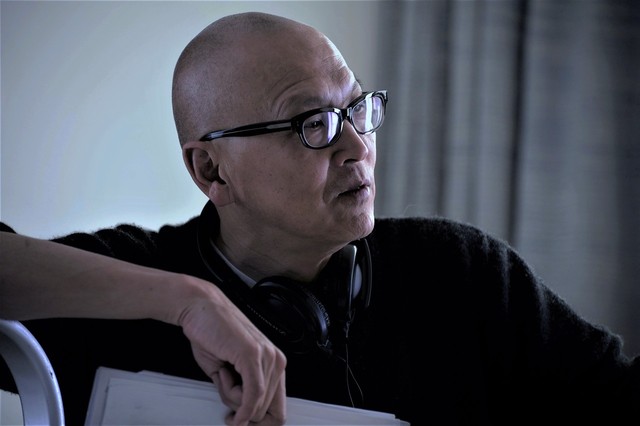Posted on : Oct.14,2019 17:33 KST
 |
|
Filmmaker Wayne Wang, who directed “Coming Home Again,” a story about a Korean-American and his mother. (provided by the Busan International Film Festival)
|
Chinese-American director Wayne Wang talks about his latest film focusing on Korean-American family
It was in 1995 that film director Wayne Wang first read Chang-Rae Lee’s “Coming Home Again” in "The New Yorker". The essay shared memories from the time the Korean-American author spent caring for his mother while she battled cancer. “It was very moving for me. I could feel the truth in this autobiographical story,” Wang said recently in an email interview exchange with the Hankyoreh.
At the time, the director – who rose to global acclaim with the films "The Joy Luck Club" (1993) and "Smoke" (1995) – was working with Lee to adapt the author’s novel "A Gesture Life", which focuses on the issue of Japanese comfort women. But few volunteered to invest their money in a film about such sensitive subject matter, and the project ended up falling through.
In 2004, Wang’s mother passed away after a long battle with Parkinson’s disease. “I felt very guilty about not being with her in the last few weeks before she passed away because I was busy working on a film,” he said. It was because of this that “Coming Home Again,” which he had read all those years before, suddenly hit him with an even greater impact. In summer 2018, he met with Lee and suggested turning “Coming Home Again” into a film. The two worked together on the adaptation, and various acquaintances were enlisted to fund the production along the same lines as an independent film. “Making this movie was basically my way of atoning for my mother’s death,” Wang said.
 |
|
A scene from Wayne Wang’s “Coming Home Again.” (provided by the Busan International Film Festival)
|
On Oct. 6, the film was screened at the 24th Busan International Film Festival in the “Gala Presentation” section, which shares new work by major filmmakers. Wang was scheduled to visit Busan in person and give a press conference, but had to cancel his trip due to sudden health issues. “An injury from shaving got infected with staphylococcus,” he explained. “It was really bad, but fortunately it’s improved rapidly over the past two days.” Feeling sorry about his absence, he sent the film festival a video message explaining about the film’s inspiration, which was shown before the screening.
In the film, the protagonist, Chang-Rae (played by Justin Chon), quits his Wall Street job and returns home to San Francisco to look after his cancer-stricken mother (Jackie Chung). His professor father is often away due to school duties; his older sister works in South Korea. The camera captures this at a slow pace, alternating between scenes of Chang-Rae caring for his mother with recollections from the past. There are no particular incidents or long dialogue between mother and son. But as viewers contemplate them from a distance, they find themselves suddenly drawn into a deep valley of feeling.
“I hope viewers think about their own lives and their parents or family members who might be sick,” Wang said. “I want them to realize that people’s lives can change at any moment, and that even death needs to be accepted as an example of the changes of life.”
 |
|
A scene from Wayne Wang’s “Coming Home Again.” (provided by the Busan International Film Festival)
|
Lee Moon-se’s song “Yetsarang [Old Love]” plays a major role in the film. The mother character hums the tune, which actually represented a bad memory – leading her to sense her husband’s past infidelity. “It’s funny how a good song can turn bad,” the mother mutters.
“For that part, I wanted to use an old Korean love song,” Wang explained. He first heard the song when a Korean staff member played it for him 22 years ago during the filming of "Chinese Box"; he recalls cinematographer Vilko Filac crying as he sang along with the “Old Love” melody. To secure the rights to use the song, Wang wrote a letter to Lee Jeong-hwan, son of the composer and copyright holder Lee Young-hoon. The song also plays over the film’s ending credits.
After the Chinese-American Wang previously focused on Chinese immigrant families in "The Joy Luck Club," his latest film turns attention to a Korean immigrant family. When asked whether he felt a kind of bond with other Asia-Americans, he replied, “It’s like a burden carried on your back. None of the production companies want to make authentic Asian-American films. These days, there are a lot of ‘pseudo’ Asian-American films, but it’s like ‘fake news.’ The burden is becoming heavier and heavier.”
Having experience directing several commercial films in Hollywood, Wang said, “I’d like to do more things like ‘Coming Home Again’ in an independent film format where there’s less interference from the business side.”
Wang’s hope is to direct more films telling Asian-American stories. Perhaps one day we might get to see his film on the Japanese comfort women issue.
By Suh Min-jung, staff reporter
Please direct comments or questions to [english@hani.co.kr]











